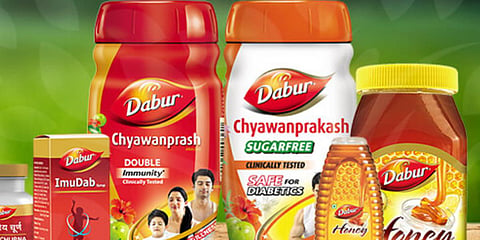

Dabur India Ltd, one of the largest packaged consumer goods companies in India, plans to venture into adjacent markets like therapeutics, baby care and tea, according to analysts who interacted with the company management at an event last week.
According to several analysts, Dabur CEO Mohit Malhotra said that the company is currently focusing on expanding its presence in the existing categories and at the same time penetrating into newer divisions to increase its total addressable market.
Dabur India is one of the largest FMCG companies in India, with an interest in health care, personal care and food products.
The company primarily operates in four segments: consumer care, international business, foods and retail.
The new plans include venturing into the Rs 11.4 billion Baby Care market under a new label ‘Dabur Baby’.
“As a result, the new product development contribution has gone up from 1.4% in FY19 to 4% in FY23,” noted analysts from IIFL Securities.
“We believe Dabur can achieve even double-digit growth as both allopathic and Ayurvedic doctors have become open to prescribing medicines from different systems and the current trend of market share capture sustains,” noted another analyst from Motilal Oswal.
Speaking on its therapeutics division, the company said that it has set a target of Rs 5,000 crores in revenue in to mid to long term.
“This division, beyond lifestyle diseases, sees a strong opportunity to participate in newer therapy and nutraceuticals segments,” noted IIFL Securities.
Dabur India's consolidated revenue in the April-June quarter of FY24 increased 11% to Rs 3,100 crore from Rs 2,800 crore, YoY, driven by strong double-digit growth in both home and personal care and healthcare businesses.
Premium Play
Besides launching products in adjacencies, the company aims to premiumise its portfolio and align it more with future trends.
The company’s 75% of the revenue is generated from its domestic business which is concentrated by its eight prominent brands (power brands) namely Chyawanprash, Honey, Pudin Hara, Lal Tail, Honitus, Amla, Red Paste & Real.
Dabur Red Paste, Dabur Amla and Vatika garner revenue of Rs 1,000 to Rs 1,500 crore while Chawanprash and honey are between Rs 500 to Rs 1,000 crore.
“Currently, Dabur is revamping its portfolio to make its power brands more appealing to youngsters by increasing relevance (new age formats) and aspirational packaging,” said Malhotra in the investors meet.
Dabur’s healthcare business, with 31.2% revenue contribution saw a three-year revenue growth of 9.3% driven by product extension through power brands and new product developments.
“The company, by targeting a younger population, has tripled its total addressable market to 1.2 trillion and retooled its strategy Dabur 2.0, moving from power brands to power platforms with an emphasis on stronger scientific claims,” said analysts from Centrum.
Dabur is increasing the relevance of its portfolio by launching innovative products in its power brands such as Dabur Chyawanprash Sugarfree, Dabur Kesarprash, Khajurprash, etc., which also help in premiumisation.
Contribution from the premium products stood at nearly 8-9% of the overall sales. Dabur is scaling the existing categories by entering into new adjacencies such as ‘Cool King’ in oils, ‘Bae Fresh Gel’ in toothpaste & ‘Mustard Oil’ in Foods.
“Premiumisation is a stated goal but our fear is that brands like Dabur could actually lose out in the event of a widespread premiumisation wave in the HPC [home and personal care] space,” said analysts from JM Financial.
Under its digital initiatives, the company aims to increase its market share by improving the process of digitalization and better product assortments.
E-commerce business contributes to 9% of the business. Contribution from new-age channels has increased from 12% in FY 2019 to 20% in FY 2023. Dabur’s digital spending contribution has risen to 31% in FY 2023 compared to less than 10% in FY 2018.